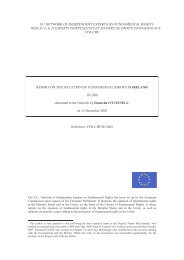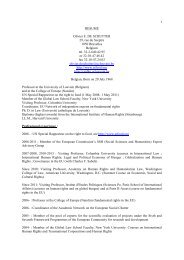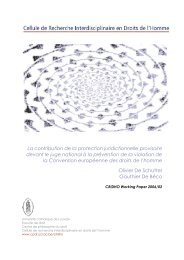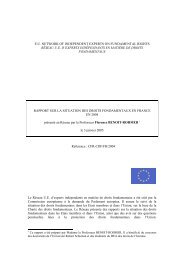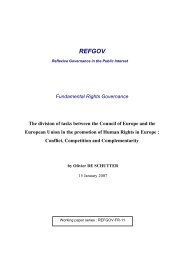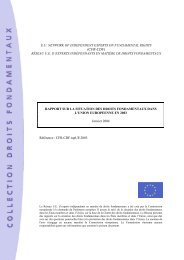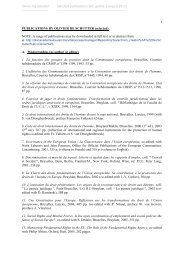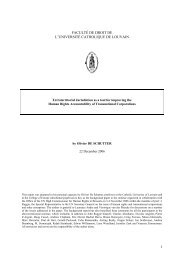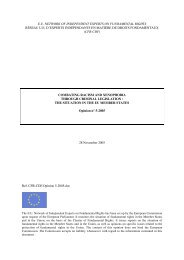The Prohibition of Discrimination under European Human ... - cridho
The Prohibition of Discrimination under European Human ... - cridho
The Prohibition of Discrimination under European Human ... - cridho
Create successful ePaper yourself
Turn your PDF publications into a flip-book with our unique Google optimized e-Paper software.
thematic report<br />
■ THE PROHIBITION OF DISCRIMINATION UNDER EUROPEAN HUMAN RIGHTS LAW ■<br />
have seen, in certain cases, discrimination on grounds <strong>of</strong> race can also constitute degrading treatment within the<br />
meaning <strong>of</strong> Article 3 <strong>of</strong> the Convention41 .A fortiori, the need to combat racial discrimination is one <strong>of</strong> the<br />
legitimate aims which the States Parties to the Convention may want to pursue, even if this leads to certain<br />
restrictions on the rights and freedoms enumerated by the Convention, such as the right to non-discrimination.<br />
This is not to say that affirmative action could be upheld only on the basis that it is combating discrimination, as a<br />
remedial or backward-looking measure. <strong>The</strong> Court views a “democratic society” as one based on the values <strong>of</strong><br />
diversity and tolerance. This would seem to imply that it would allow forms <strong>of</strong> positive action which are not<br />
premised on pre-existing discrimination they seek to respond to or compensate for, but are justified by the aim <strong>of</strong><br />
organizing diversity. It is however likely that it would consider positive action as a disproportionate restriction <strong>of</strong><br />
the right to formal equality where it would not correspond to the criteria set forth in the relevant international<br />
human rights treaties42 , in particular where the measure would not be temporary but would risk leading, instead,<br />
to the creation and maintenance <strong>of</strong> separate rights.<br />
2. <strong>The</strong> Scope <strong>of</strong> Application <strong>of</strong> Article 14 ECHR<br />
Article 14 <strong>of</strong> the <strong>European</strong> Convention on <strong>Human</strong> Rights does not create an independent protection from<br />
discrimination. It may only be invoked in combination with another substantive provision <strong>of</strong> the <strong>European</strong><br />
Convention on <strong>Human</strong> Rights or <strong>of</strong> one <strong>of</strong> its additional Protocols : it is only when discrimination is found to exist<br />
in the enjoyment <strong>of</strong> the rights and freedoms set forth in the Convention that it will come into play. This is not to say<br />
that Article 14 ECHR has no autonomous function to fulfil in the system <strong>of</strong> the Convention. On the contrary, it<br />
supplements all the other substantive provisions by adding the requirement that they be applied and<br />
implemented without discrimination. In the case “relating to certain aspects <strong>of</strong> the laws on the use <strong>of</strong> languages in<br />
education in Belgium” v. Belgium (the « Belgian Linguistics Case »), the Court famously noted that, although the right<br />
to obtain from the public authorities the creation <strong>of</strong> a particular kind <strong>of</strong> educational establishment could not be<br />
inferred from Article 2 <strong>of</strong> Protocol No. 1,<br />
41<br />
42<br />
43<br />
... nevertheless, a State which had set up such an establishment could not, in laying down entrance<br />
requirements, take discriminatory measures within the meaning <strong>of</strong> Article 14. [Thus, similarly,] Article 6 <strong>of</strong> the<br />
Convention does not compel States to institute a system <strong>of</strong> appeal courts. A State which does set up such<br />
courts consequently goes beyond its obligations <strong>under</strong> Article 6. However it would violate that Article, read in<br />
conjunction with Article 14, were it to debar certain persons from these remedies without a legitimate reason<br />
while making them available to others in respect <strong>of</strong> the same type <strong>of</strong> actions. In such cases there would be a<br />
violation <strong>of</strong> a guaranteed right or freedom as it is proclaimed by the relevant Article read in conjunction with<br />
Article 14. It is as though the latter formed an integral part <strong>of</strong> each <strong>of</strong> the Articles laying down rights and<br />
freedoms. No distinctions should be made in this respect according to the nature <strong>of</strong> these rights and freedoms<br />
and <strong>of</strong> their correlative obligations, and for instance as to whether the respect due to the right concerned<br />
implies positive action or mere abstention. 43<br />
<strong>European</strong> Commission <strong>of</strong> <strong>Human</strong> Rights, case <strong>of</strong> East African Asians (Patel et al.), decision <strong>of</strong> 10 October 1970, Ann. Conv., vol. 13, p. 995; Eur. Ct.<br />
H.R., Abdulaziz, Cabales and Balkandali v. United Kingdom, judgment <strong>of</strong> 29 May 1985, Series A n°94, p. 42, §§ 90-91; Eur. Ct. H.R., Smith and Grady<br />
v. United Kingdom, judgment <strong>of</strong> 27 September 1999, § 121.<br />
See for a summary <strong>of</strong> the position adopted by the relevant international instruments Sub-Commission on the Promotion and Protection <strong>of</strong><br />
<strong>Human</strong> Rights (53d session), United National Commission on <strong>Human</strong> Rights, Prevention <strong>of</strong> <strong>Discrimination</strong>,“<strong>The</strong> concept and practice <strong>of</strong><br />
affirmative action”, final report submitted by Mr Marc Bossuyt, Special Rapporteur, in accordance with the Sub-Commission Resolution 1998/5,<br />
E/CN.4/Sub.2/2002/21 (21 June 2002).<br />
Eur. Ct. HR, judgment <strong>of</strong> 23 July 1968, Series A no. 6, pp. 33-34, § 9.<br />
20



